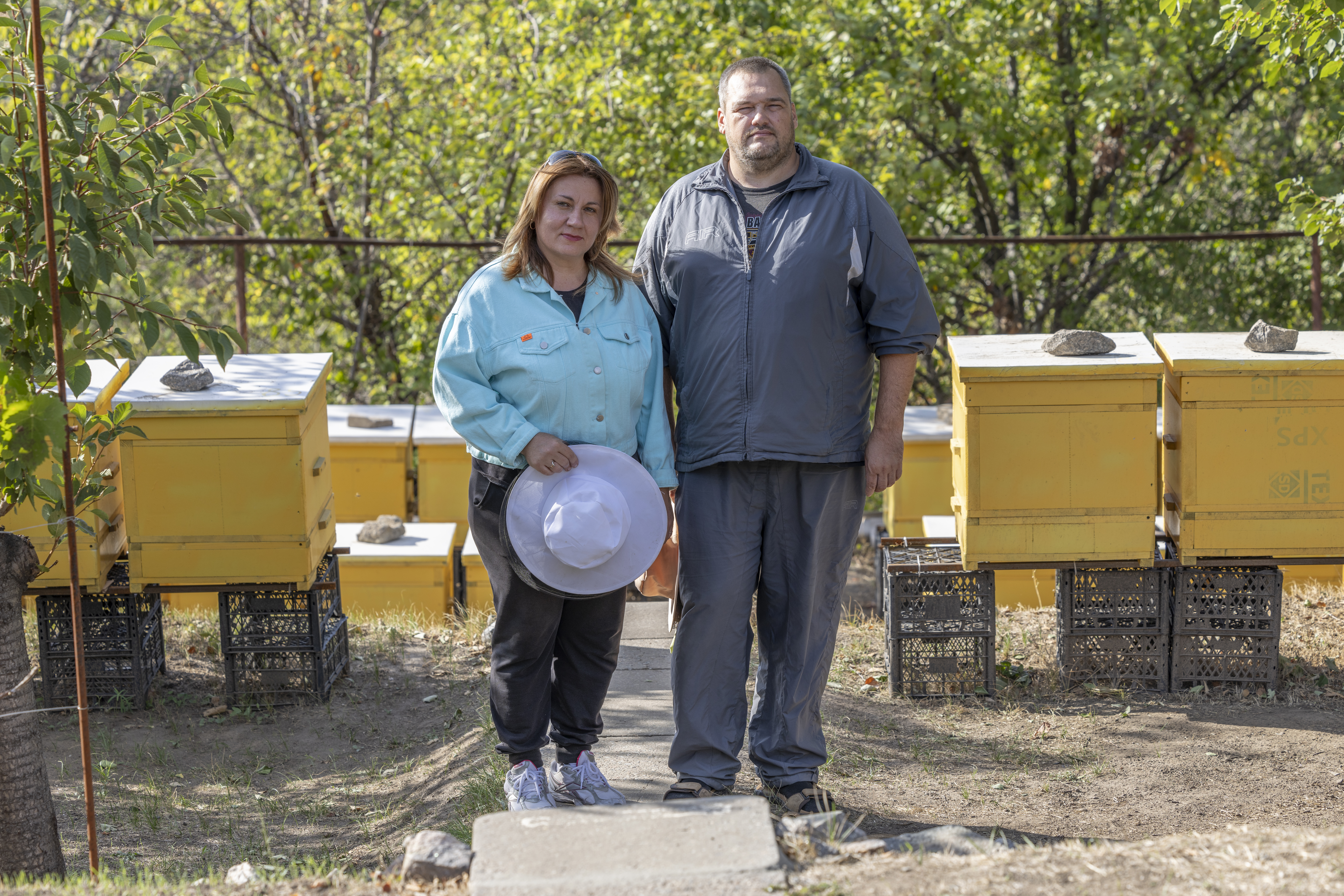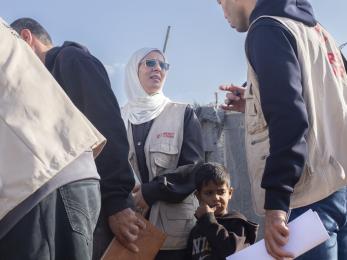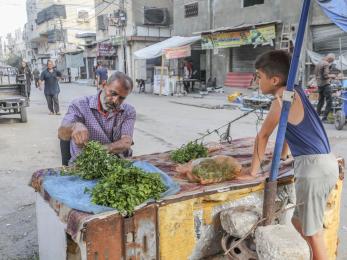Two years of devastation in Gaza felt across every community

This October marks two years since the deadly attack on Israel by Hamas. The conflict that followed sparked a man-made humanitarian crisis that continues to spiral, causing two long years of devastation, displacement, and unrelenting hunger across Gaza.

The suffering is immense: At least 1.9 million people across the Gaza Strip—about 90% of the population—have been forced from their homes, according to the United Nations. But beyond these staggering numbers, the crisis is felt one community and family at a time. Some families have been displaced over and over again. Some have had to rebuild and find shelter 10 times or more.
“Just the thought of displacement brings a heavy pain to our hearts,” said Osama*, a Mercy Corps team member in Gaza City. “What displacement strips away most is the fragile sense of safety that only a home can give. Even in a city under siege, a home provides a thread of physical and emotional grounding. Once that is taken, the void is immeasurable.”

In the face of this ongoing crisis, our staff in Gaza continue to serve with courage and humanity as they have done for two years while also experiencing the same bombardment, hardships, and desperate need as the communities who are being supported.
Since October 2023, Mercy Corps team members and local partners have reached over 385,000 people with emergency items—food baskets, hygiene, water, and shelter kits—and supported more than 33,300 families with emergency cash assistance as prices continue to rise exponentially. But with borders still closed, the trickle of aid reaching Gaza barely scratches the surface while the need grows more urgent by the hour.
“Food and water remain a constant struggle everywhere”
“The food situation is dire in every sense,” said Osama. Famine is tearing through Gaza City and spreading. With aid and food supplies actively blocked, nearly the entire population is hungry, and malnutrition is surging.
“Food and water remain a constant struggle everywhere,” said Osama. “From the difficulty of purchasing to the effort of cooking without proper fuel to the lack of variety, the meals we manage to prepare are poor in quality, lacking both nutrition and value.”
At least 132,000 children younger than five are at risk of death from acute malnutrition, more than double the number estimated earlier in May, according to IPC (Integrated Food Security Phase Classification), a leading agency analyzing food security. Deaths from starvation and preventable disease are now everyday realties, with children at greatest risk.

Approximately 98% of cropland in the Gaza Strip is either damaged, inaccessible, or both. Livestock has been decimated, and fishing activities are banned. Skyrocketing prices have put even the little food available out of reach for most families.
Since June 2025, Mercy Corps has provided emergency cash assistance to more than 800 households, supporting nearly 4,700 people to purchase food and supplies. Mercy Corps is preparing to launch a pilot project to help families grow their own food to eat—reducing reliance on external aid, and exploring sustainable, localized options.
“Families struggle to find even a sip of clean water”
“The situation in Gaza is beyond dire, and in Gaza City it is even worse,” said Hisham*, another Mercy Corps team member in Gaza. “Streets are reduced to rubble, houses lie in ruins, market prices soar beyond reach, transportation has collapsed, and families struggle to find even a sip of clean water.”
Along with the destruction of critical infrastructure like hospitals and schools, water and sewage systems have been damaged and destroyed. Access to safe drinking water is critical, it's a basic necessity and essential for preventing disease. Since June, Mercy Corps has been working with local partner organization, Palestine Environmental Friends, to deliver clean water to households living in camps for displaced people.
Every day in central Gaza, Mercy Corps is delivering clean water to an average of 800 households (approximately 4,000 individuals) in Deir al-Balah. We’re prioritizing water trucking since much of the water and sanitation infrastructure has been destroyed. But the scale of need far outpaces what little we can provide, due to limited funding and severe barriers to delivering aid.
“I could never express the depth of this suffering”
“People move through the streets like shadows, like zombies, numb to what surrounds them,” said Hisham. “Whatever you see in the news, no matter how accurate, can never compare to the reality of living inside Gaza. Words cannot capture it, even if I screamed until my voice broke, I could never express the depth of this suffering.”

Nowhere in Gaza is safe. People are being pushed to the edge of survival. The combination of ongoing hunger and being forced to move over and over again are compounding the emotional damage of living through conflict.
“The psychological toll is crushing,” said Osama. “After months of suffering, fear, and loss, our minds and hearts are exhausted. Just imagining another displacement fills us with despair.”
A call for ceasefire and an end to aid blockade
“For two years, families have endured relentless loss of loved ones, of homes, of safety, and of the simple dignity of daily life,” said Tjada D’Oyen McKenna, Mercy Corps CEO. “They are losing what little hope in humanity they have left. Children are growing up knowing nothing but fear and deprivation, while parents make impossible choices just to try to keep them alive.”
“The current restrictions prevent us from helping at the scale needed and it is unbearable to stand by and watch this catastrophe unfold. It is an entirely man-made crisis that can be stopped. We urgently call on the international community, all parties to the conflict, and all those with influence to act now: to secure an immediate and lasting ceasefire; to protect civilians and civilian infrastructure as well as aid workers; to restore essential services; to release the hostages to their families; and to guarantee safe, sustained humanitarian access.”

In addition to our current cash aid and water delivery, Mercy Corps is on standby to deliver lifesaving assistance to over 160,000 people and to support millions more through humanitarian partners. Critical supplies have been stuck at the border for months, including thousands of emergency shelters, food, and hygiene kits.
Even in the face of immense challenges, our team is working tirelessly to ensure families have the support they need to endure and hold onto hope.
*Names have been changed.


